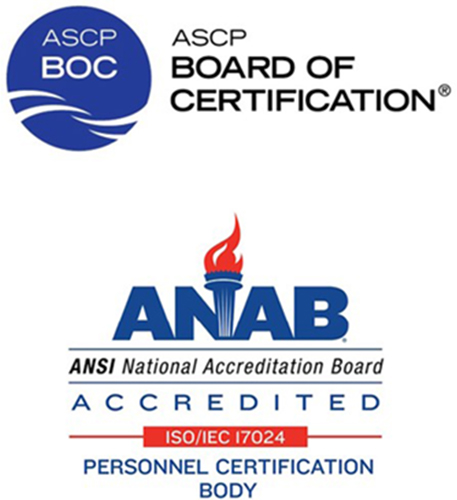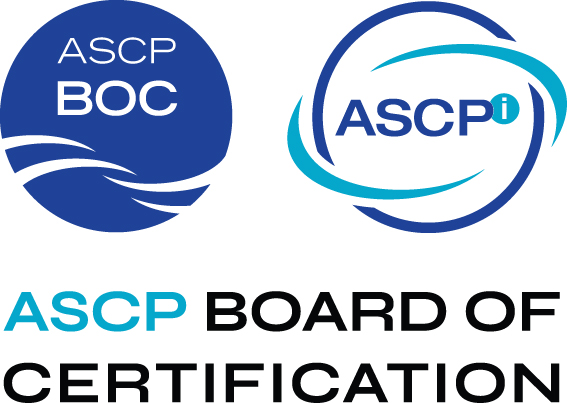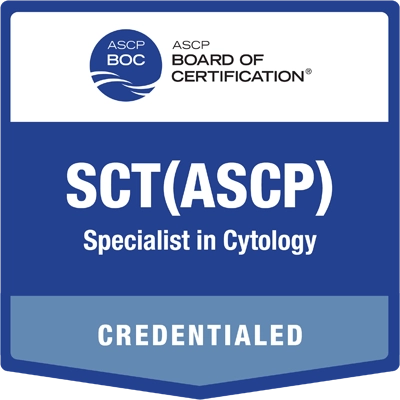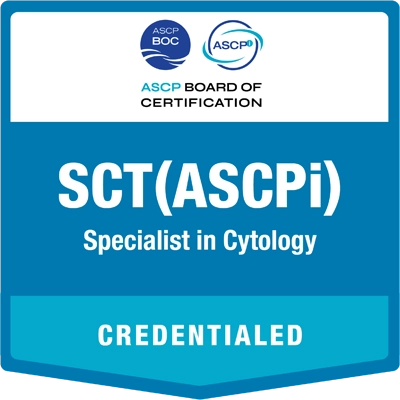Obtain certification and advance your career in cytology with our specialized credential.
Skilled in examining cellular specimens from all body sites including rapid on-site evaluation of needle aspirates, endoscopic/bronchoscopic ultrasound-guided fine needle aspirations, and advanced cancer diagnostics under the direction of a pathologist. May also direct quality assurance programs in cytopathology. Specialists have advanced knowledge, skills, and abilities; they serve as leaders, educators, and advisors within their specialty area.
Attaining an American Society for Clinical Pathology Board of Certification (ASCP BOC) credential requires a laboratory professional or other expert to meet specific education, training, and/or experience standards and to successfully pass an examination demonstrating knowledge and applied skills. The ASCP BOC offers ASCP and ASCPi credentials based on distinct eligibility requirements. All candidates must carefully compare credentialing options. Additional information is available about the similarities and differences between ASCP and ASCPi credentials.
Each credential has specific eligibility requirements, which are different for ASCP and ASCPi. It’s your responsibility to confirm that your education, training, and/or experience meet the criteria. Submit the correct documentation with your application. Once submitted, the category and route of application cannot be changed.
Check Your EligibilityThe ASCP BOC remains a partner to Cytology Programs, cytologists, and the patients they serve. As the scope of practice and the professional landscape for cytologists evolve, we aim to provide you with valuable resources.
Here are some key updates for your awareness:
While CAAHEP-accredited Cytology Programs are transitioning from baccalaureate to master’s level programs, a graduate of either of these program types is eligible to apply for the CT(ASCP) examination under Route 1 for up to 5 years after program completion.
Graduates of master’s degree CAAHEP-accredited Cytology Programs may choose to apply for the CT(ASCP) exam under Route 1, and/or the SCT(ASCP) exam under Route 3.
Both the CT(ASCP) and SCT(ASCP) examinations will continue to be offered for the foreseeable future.
Effective July 2024, the Centers for Medicare and Medicaid Services (CMS) and the Centers for Disease Control and Prevention (CDC) have recognized the ASCP BOC SCT certification as an approved board examination for individuals to meet the CLIA personnel qualifications of 42 CFR 493.1483. Click here for complete information.
This approval is inclusive of all SCT(ASCP) credential holders, including those who tested under Route 3 prior to July 2024. With this approval, all CT(ASCP) and SCT(ASCP) credential holders are recognized in the CLIA personnel qualifications of 42 CFR 493.1483. This is a significant win for all ASCP BOC credentialed cytologists and the patients they serve.
An applicant must be able to verify that they meet all eligibility requirements, including education, training, and/or experience. For complete information, see the Documentation section of the website.
Education does not need to be from the United States. Details are available by reviewing the webpage titled Acceptable Education, also available in the routes below.
To be eligible for this examination category, an applicant must satisfy the minimum requirements (for degrees, the stated degree or higher) of at least one of the following routes:
Cytologists (previously Cytotechnologists) Employment in the U.S.: According to U.S. standards (CLIA ’88-Clinical Laboratory Improvement Act of 1988), all individuals practicing cytology in the United States must have completed a Cytology / Cytotechnology program accredited by the Commission on Accreditation of Allied Health Education Programs (CAAHEP).
In turn, a cytologist who has earned the CT(ASCPi), CTgyn(ASCPi), or SCT(ASCPi) credentials may not be qualified to practice in the United States per CLIA ’88 legislation. A cytologist must explore and validate federal, state, and organizational-level requirements related to ASCPi credentials.
An applicant must be able to verify that they meet all eligibility requirements, including education, training, and/or experience. For complete information, see the Documentation section of the website.
Education needs to be equivalent to education from the United States. Details are available by reviewing the document titled Acceptable Education, also available in the routes below.
To be eligible for this examination category, an applicant must satisfy the minimum requirements (for degrees, the stated degree or higher) of at least one of the following routes:


Valid CT(ASCP) certification,
AND a baccalaureate degree from an accredited (regionally or nationally) college/university,
AND 3 years of full-time acceptable clinical* experience in cytology in an acceptable laboratory within the last 6 years. These 3 years of experience must be obtained following CT(ASCP) certification and must be documented on this Experience Documentation Form.
*Acceptable Clinical Laboratory:
CMS CLIA certificate of registration, compliance, accreditation;
OR DoD CLIP certificate of registration, compliance, accreditation;
OR JCI accreditation;
OR Accreditation under ISO 15189.
Valid CT(ASCP) certification,
AND a baccalaureate degree from an accredited (regionally or nationally) college/university,
AND 3 years of full-time acceptable experience as an academic educator in cytology at an accredited (regionally or nationally) college/university or an acceptable laboratory* within the last 6 years. These 3 years of experience must be obtained following CT(ASCP) certification and must be documented on this Teaching Experience Documentation Form.
*Acceptable Clinical Laboratory:
CMS CLIA certificate of registration, compliance, accreditation;
OR DoD CLIP certificate of registration, compliance, accreditation;
OR JCI accreditation;
OR Accreditation under ISO 15189.
Master’s degree from an accredited (regionally or nationally) college/university,
Valid CT(ASCPi) certification,
AND a baccalaureate degree from an accredited/approved* educational institution,
AND 3 years of acceptable clinical# experience in cytology in an accredited/approved laboratory. These 3 years of experience must be obtained following CT(ASCPi) certification and must be documented on this Experience Documentation Form.
*Accredited/approved by a governing regulatory association or Ministry. Countries without a prevalent system of accreditation/approval must have programs/educational institutions approved by an International Advisory Board appointed by the ASCP Board of Certification, or eligibility will be determined by an acceptable transcript evaluation. The foreign degree must be equivalent to a U.S. degree.
#Clinical laboratory accredited by JCI, CAP, under ISO 15189 or authorized by a governing regulatory association or Ministry. Countries without a prevalent system of accreditation must have laboratories approved by an International Advisory Board appointed by the ASCP Board of Certification.
Valid CT(ASCPi) certification,
AND a baccalaureate degree from an accredited/approved* educational institution,
AND 3 years of acceptable experience as an academic educator in clinical cytology in an accredited/approved* educational institution or an accredited/approved laboratory#. These 3 years of experience must be obtained following CT(ASCPi) certification and must be documented on this Teaching Documentation Form.
*Accredited/approved by a governing regulatory association or Ministry. Countries without a prevalent system of accreditation/approval must have programs/educational institutions approved by an International Advisory Board appointed by the ASCP Board of Certification, or eligibility will be determined by an acceptable transcript evaluation. The foreign degree must be equivalent to a U.S. degree.
#Clinical laboratory accredited by JCI, CAP, under ISO 15189 or authorized by a governing regulatory association or Ministry. Countries without a prevalent system of accreditation must have laboratories approved by an International Advisory Board appointed by the ASCP Board of Certification.
Reduced pricing is available for those educated and residing in low-to-middle income countries.
You must upload the appropriate documentation form when you apply online, verifying that you meet the training and/or experience requirements for your category and route of application. You will also need to submit an acceptable transcript or transcript evaluation verifying that you meet the academic requirements. Gather your documents before submitting your application and application fee.
Once you have confirmed that you meet the requirements and have gathered your documents, submit your online application.
 |  |
In early 2026, the ASCP BOC will launch digital badging through Credly, a trusted provider that increases the visibility of ASCP BOC credential holders by securely showcasing and sharing professional credentials. Learn more about digital badges.
